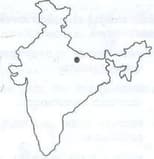The Non-Cooperation and Khilafat Movement began in January . ()
Important Questions on Nationalism in India
Read the given statements and identify the correct Act which is related to all of them:
A. This act formulated Bi-cameral legislative body at the centre.
B. As per this Act “Diarchy” was allowed at regional government.
C. As per this Act a High Commissioner was appointed for India.
D. As per this Act Provincial budget was separated from Central budget.
Observe the location on the map of India and choose the correct incident related to it.

Statement I: Russia army lost badly in Germany and Austria in - . All able-bodied men were called to the war which led to the scarcity of bread.
Statement II: Tsarist autocracy collapsed in .
In the light of political development that took place in the first quarter of twentieth-century India, match the following:
| Place | Event | Year |
| I. Amritsar | A. Mill Workers Strike | i. |
| II. Kheda | B. Rowlatt Act | ii. |
| III. Ahmedabad | C. Peasant Strike | iii. |
| IV. Champaran | D. Plantation Workers Strike | iv. |
| E. Khilafat Movement | v. |
Read the statements and select the correct answer from the options given below:
Statement-I: Mahatma Gandhi successfully organized the Satyagraha movement of 1916 and 1917 in favour of peasants.
Statement-II: In Champaran, Gandhi ji inspired the middle class to struggle against the oppressive plantation system and in Kheda district of Gujarat he supported their demand for relaxation in revenue collection affected by crop failure.
Which of the following were associated with Non-Cooperation Movement?
I. It was the first movement started by Mahatma Gandhi.
II. Indian institutions were created to replace the British administration.
III. It called for a total boycott of all arms of the British administration by the Indians.
IV. Khilafat movement also began with this movement.

